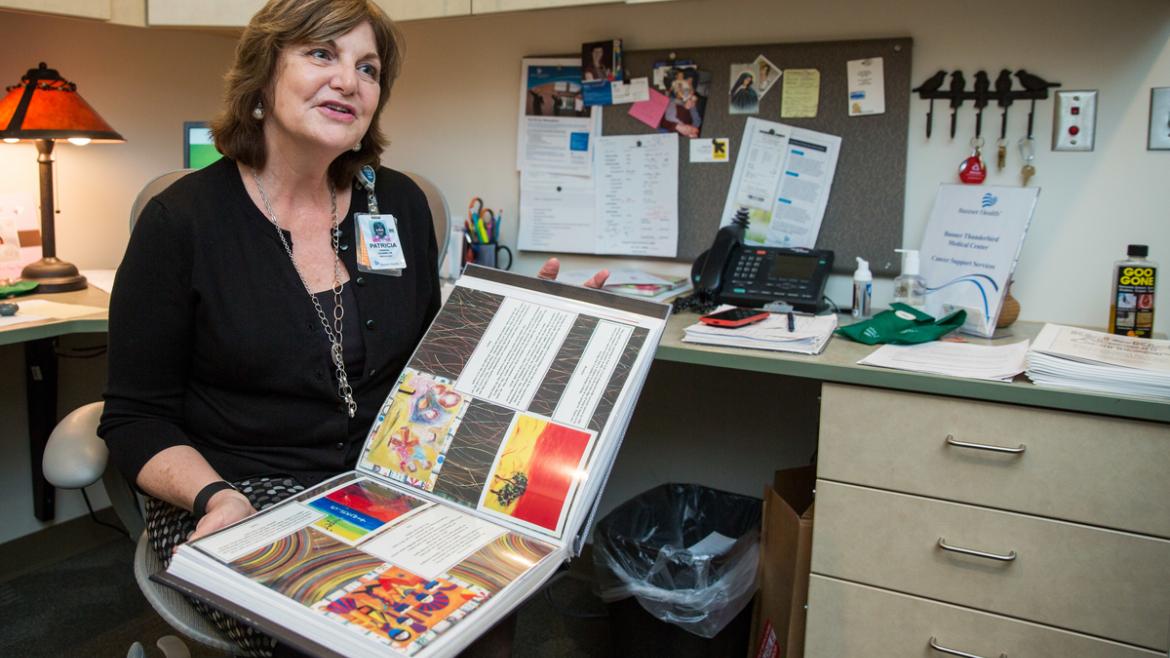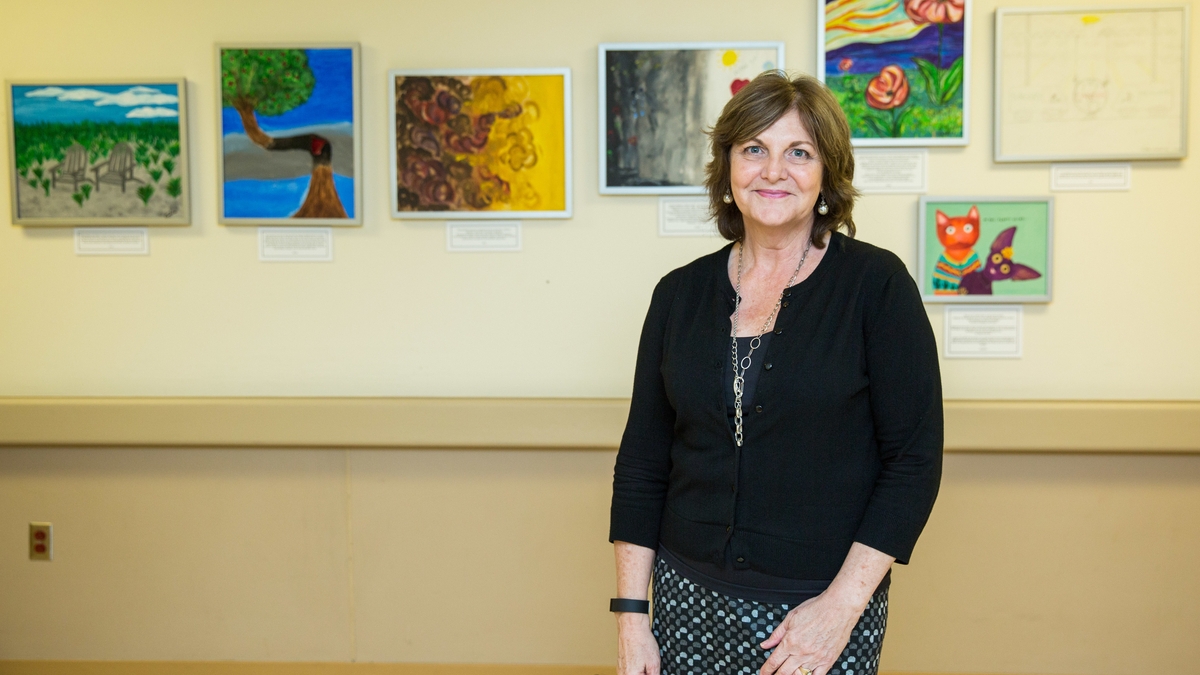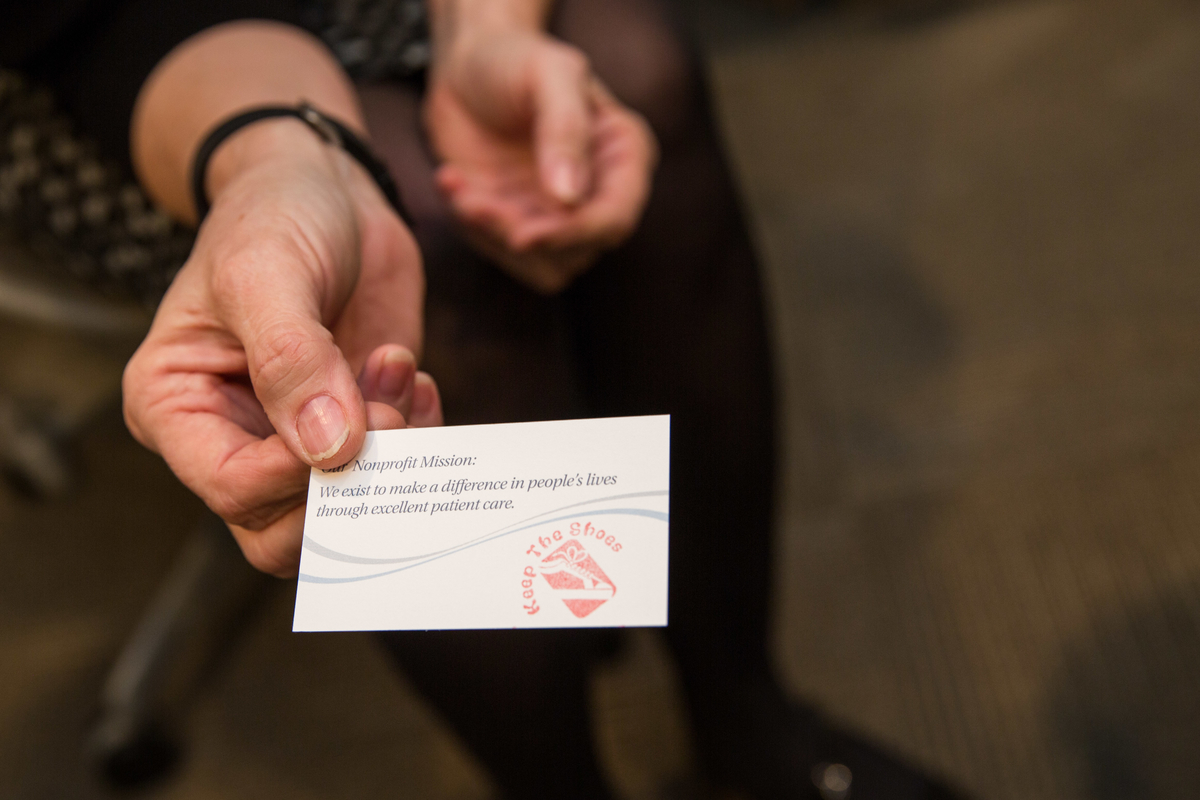Patricia DeBruhl wants all of her cancer patients to keep their shoes.
It may sound cryptic, but after DeBruhl’s friend was diagnosed with colon cancer several years ago her first inclination was to return a brand-new pair of walking shoes.
After all, the friend didn’t think she was going to need them.
That’s where DeBruhl comes in.
Part of her job is to reaffirm with her patients that their lives aren’t over once they receive a diagnosis of cancer. It’s why “Keep the Shoes” is the logo she chose for the back of her business card; she feels the message underscores that a diagnosis is just the start of a journey, not a death sentence.
“The first thing I tell patients is, ‘You’ve just been told that you’re going on a trip that you didn’t know you were going on,’ ” said DeBruhl, who is an integrative health counselor and oncology support liaison for Banner Thunderbird Medical Center in Glendale.

Patricia DeBruhl is an integrative health counselor and oncology support liaison for Banner Thunderbird Medical Center in Glendale.
Photos by Deanna Dent/ASU Now
“So before we all get caught up in the fact that our hair’s going to fall out or that we’re going to die, or how am I going to tell my kids, I try to bring them back to what do we know, what do we still need to learn and let’s figure out how to bring in the strength of your resources to shore up the work that's going to help you pack your suitcase for the journey.”
DeBruhl’s own journey with cancer started almost four decades ago at age 21. That’s when her father received the news he had Stage 4 lung cancer and had six months to live.
“It was an era when no one even said the word ‘cancer.’ Everybody called it ‘The Big C.’ Hospitals gave the same chemo treatment for multiple types of cancer,” DeBruhl said. “Doctors and hospitals did their best, but it wasn’t very involved. If there were support groups, we certainly didn’t know about it. I think ‘numb’ was the best word to describe us at that time.”
DeBruhl’s father died at 56 years old, a month after her college graduation and wedding. She soldiered on with her life, teaching elementary education in the Washington School District in Phoenix and then starting a family of her own. DeBruhl ran a non-profit for 12 years and then decided to get her masters and doctorate at ASU.
“I knew that counseling was the way to go, but I didn’t really know what counseling was at the time,” DeBruhl said. “I thought it was about giving advice, but counseling is about helping the other person figure out what it is they need to do. It’s kind of reflecting a mirror back on them.”
DeBruhl took that look into the mirror almost a decade ago when she started studying for her Master of Counseling Degree, which she obtained in 2006. That same year she started working for Banner Desert Medical Center in Mesa as an intern, which ASU arranged.
“I was told very quickly it was an internship and there was no job attached. I loved it because they gave me a badge and I felt a part of a family,” DeBruhl said. “As the months passed by, I loved it so much that I wanted to stay. I wanted to keep that badge. I wanted to stay so bad that they’d have to peel my fingers from the door and rip that badge away from me because I didn’t want to leave. I was so committed to working there that it showed. Everybody there believed in my passion.”
Banner Desert believed in her passion so much that they hired her as an oncology counselor. It was there where DeBruhl set up several innovative cancer support groups and programs in the Valley, and she was eventually recognized last August as a “Health Care Hero” by the Phoenix Business Journal.
Patricia DeBruhl shares her business card, stamped with her inspirational motto "Keep the Shoes."
During her 9½-year tenure at Banner Desert, DeBruhl set up the Day of Art program where people facing cancer paint pictures to gain a better understanding of their journey. DeBruhl believes exposure to creative arts therapy helps reduce depression, anxiety and pain as well as improves their quality of life. She also developed a ballroom dance program for patients, and even arranged for professionals to dress in scrubs and dance in the hallways to cheer up patients.
“I felt like if we can do art, why can’t we sing? Why can’t we dance? Why can’t we engage the entire person?” DeBruhl said. “We don’t want the hospital to be a depressing place. This is a community health center. Let’s talk about good health and embracing life.”
While DeBruhl got her patients to embrace life, she embraced ASU once again to obtain her Doctor of Behavioral Health in the College of Health Solutions, which she earned in 2011. And she still remains a dance partner with the university, coordinating interns for her department. She moved to Banner Thunderbird in June.
“The teaching piece in my life has come full circle,” DeBruhl said. “I love supervising interns because it allows my relationship with ASU to continue.”
Her journey is still going strong. Good thing DeBruhl has some comfortable shoes.
More Science and technology

Compact X-ray laser lab aims to reveal deep secrets of life, matter and energy
X-rays allow us to view inside the human body to diagnose broken bones and other hidden problems. More recent X-ray advances are making it possible to see events at the scale of atoms and molecules,…

Apollo lunar samples enable ASU researcher to pinpoint moon’s crystallization timeline
A team of researchers, including Arizona State University geochemist Melanie Barboni, in collaboration with scientists from The University of Chicago, have made a new discovery about the history of…

NASA launches space telescope to chart the sky and millions of galaxies
California’s Vandenberg Space Force Base was the site for Tuesday’s 8:10 p.m. launch of the NASA SPHEREx mission aboard a SpaceX Falcon 9 rocket.The SPHEREx (Spectro-Photometer for the History of the…



